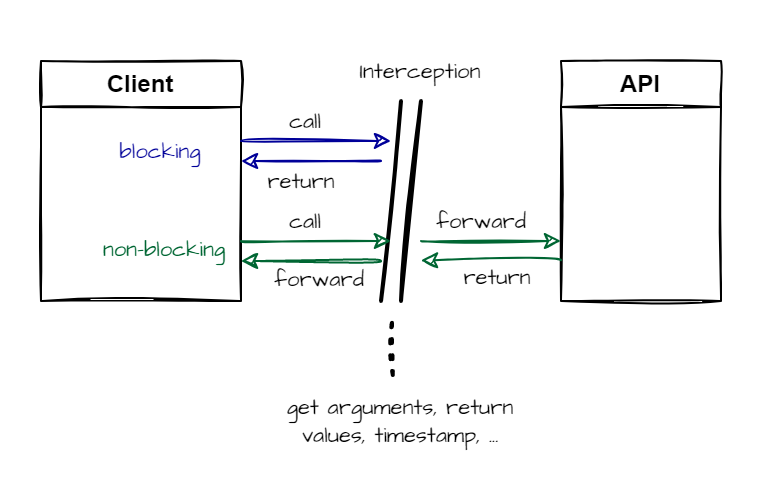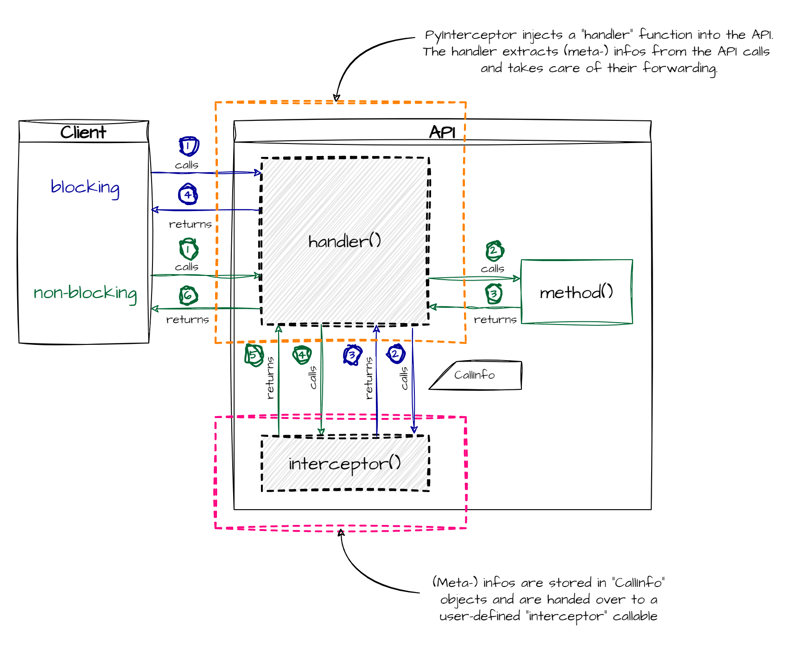Analyzing APIs with PyInterceptor
PyInterceptor: A Python Function Call Interceptor for Non-Invasive Analysis
PyInterceptor is a Python library currently under development (available on GitHub) designed for non-invasive interception and analysis of function calls. Imagine needing detailed information—function names, parameters, return values, execution times—from a Python client interacting with a Python API, without modifying the existing code. PyInterceptor addresses this need.
This dev.to article introduces PyInterceptor's core concepts, use cases, and application.
Python Call Interception and Processing
Core Principles

Function call interception falls into two categories: blocking and non-blocking (Figure 1). Blocking interception captures call information and returns immediately, without executing the target function. This is beneficial for creating mocks or stubs during unit testing. Non-blocking interception gathers information, then executes the target function, capturing its return value before proceeding. PyInterceptor supports both modes.
Use Cases
Interception of Python API calls offers numerous applications:
- Automated Mock/Stub Creation: Utilize blocking mode to semi-automatically generate mocks and stubs for unit tests. PyInterceptor allows custom interceptor callables for returning simulated data.
- Structured Logging: Forward intercepted arguments and metadata to a logging system.
- Enhanced Debugging: Pinpoint bugs more efficiently by tracking function calls and their parameters.
- Call Statistics Generation: Collect performance metrics.
- And more…
Detailed Implementation

PyInterceptor operates by inserting a handler function that intercepts calls intended for the API. This handler captures metadata (arguments, timestamps, etc.), stores it in a CallInfo object, and manages call forwarding.
In blocking mode, the handler passes CallInfo to a user-defined interceptor callable. This callable processes the information (logging, statistics, etc.). The handler then returns the interceptor's result.
In non-blocking mode, the handler executes the target function, adds its return value to CallInfo, and then calls the interceptor. The actual target function's return value is returned to the caller, unlike in blocking mode.
Illustrative Code Example
This example demonstrates PyInterceptor's use with an arithmetic API and a Processor class, logging all method calls to a JSON file.
import json
from pathlib import Path
from typing import List
from interceptor import intercept, get_methods, CallInfo
class API:
# ... (API methods remain unchanged) ...
class Processor:
# ... (Processor methods remain unchanged) ...
class JSONLogger:
# ... (JSONLogger class remains unchanged) ...
if __name__ == '__main__':
# ... (Main method remains unchanged) ...The main method creates a JSONLogger instance (acting as the interceptor), intercepts the API and Processor methods using intercept(), executes Processor methods, and saves the logs to "logs.json". The JSON output contains a detailed record of each function call.
Future Enhancements
Planned improvements for PyInterceptor include:
- Comprehensive API documentation and CI/CD pipeline.
- Python decorators for simplified class/method interception.
- Configuration options for managing memory usage (copying vs. referencing CallInfo data).
- Pre-built interceptor implementations for common use cases.
Your feedback is welcome! Please leave a comment if you found this article helpful or have suggestions for future development.
The above is the detailed content of Analyzing APIs with PyInterceptor. For more information, please follow other related articles on the PHP Chinese website!

Hot AI Tools

Undresser.AI Undress
AI-powered app for creating realistic nude photos

AI Clothes Remover
Online AI tool for removing clothes from photos.

Undress AI Tool
Undress images for free

Clothoff.io
AI clothes remover

AI Hentai Generator
Generate AI Hentai for free.

Hot Article

Hot Tools

Notepad++7.3.1
Easy-to-use and free code editor

SublimeText3 Chinese version
Chinese version, very easy to use

Zend Studio 13.0.1
Powerful PHP integrated development environment

Dreamweaver CS6
Visual web development tools

SublimeText3 Mac version
God-level code editing software (SublimeText3)

Hot Topics
 1377
1377
 52
52
 How to solve the permissions problem encountered when viewing Python version in Linux terminal?
Apr 01, 2025 pm 05:09 PM
How to solve the permissions problem encountered when viewing Python version in Linux terminal?
Apr 01, 2025 pm 05:09 PM
Solution to permission issues when viewing Python version in Linux terminal When you try to view Python version in Linux terminal, enter python...
 How to efficiently copy the entire column of one DataFrame into another DataFrame with different structures in Python?
Apr 01, 2025 pm 11:15 PM
How to efficiently copy the entire column of one DataFrame into another DataFrame with different structures in Python?
Apr 01, 2025 pm 11:15 PM
When using Python's pandas library, how to copy whole columns between two DataFrames with different structures is a common problem. Suppose we have two Dats...
 How to teach computer novice programming basics in project and problem-driven methods within 10 hours?
Apr 02, 2025 am 07:18 AM
How to teach computer novice programming basics in project and problem-driven methods within 10 hours?
Apr 02, 2025 am 07:18 AM
How to teach computer novice programming basics within 10 hours? If you only have 10 hours to teach computer novice some programming knowledge, what would you choose to teach...
 How does Uvicorn continuously listen for HTTP requests without serving_forever()?
Apr 01, 2025 pm 10:51 PM
How does Uvicorn continuously listen for HTTP requests without serving_forever()?
Apr 01, 2025 pm 10:51 PM
How does Uvicorn continuously listen for HTTP requests? Uvicorn is a lightweight web server based on ASGI. One of its core functions is to listen for HTTP requests and proceed...
 How to dynamically create an object through a string and call its methods in Python?
Apr 01, 2025 pm 11:18 PM
How to dynamically create an object through a string and call its methods in Python?
Apr 01, 2025 pm 11:18 PM
In Python, how to dynamically create an object through a string and call its methods? This is a common programming requirement, especially if it needs to be configured or run...
 How to avoid being detected by the browser when using Fiddler Everywhere for man-in-the-middle reading?
Apr 02, 2025 am 07:15 AM
How to avoid being detected by the browser when using Fiddler Everywhere for man-in-the-middle reading?
Apr 02, 2025 am 07:15 AM
How to avoid being detected when using FiddlerEverywhere for man-in-the-middle readings When you use FiddlerEverywhere...
 What are some popular Python libraries and their uses?
Mar 21, 2025 pm 06:46 PM
What are some popular Python libraries and their uses?
Mar 21, 2025 pm 06:46 PM
The article discusses popular Python libraries like NumPy, Pandas, Matplotlib, Scikit-learn, TensorFlow, Django, Flask, and Requests, detailing their uses in scientific computing, data analysis, visualization, machine learning, web development, and H
 How to handle comma-separated list query parameters in FastAPI?
Apr 02, 2025 am 06:51 AM
How to handle comma-separated list query parameters in FastAPI?
Apr 02, 2025 am 06:51 AM
Fastapi ...




